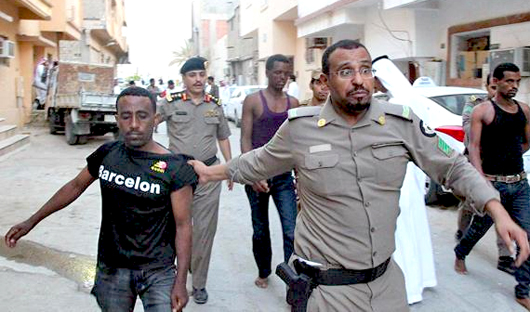
Riyadh, Aug 22: Police arrested a large number of illegal expatriates in the south of the capital in an early morning raid on Thursday under the direct supervision of Riyadh Gov. Prince Turki bin Abdullah bin Abdul Aziz.
According to one eyewitness, operations started immediately after dawn prayers.
He said that more than 400 undocumented expatriates, including women and children living in the Manfouha district south of Batha, were rounded up during operations.
The majority of those arrested are African nationals, according to the witness.
The illegals will be investigated and subject to fines and deportation depending on each case, said police sources.
The Riyadh Police Department carried out the operations in cooperation with other security forces.
The Ministry of Interior had warned illegal expatriates in the Kingdom to legalize their status by Nov. 1, 2013 or leave the country.
Riyadh police also arrested 307 illegal residents, including 13 wanted men, last month in a pre-dawn operation. The combing operations were conducted upon the instructions of Prince Turki.
According to Riyadh police, the 24-hour operation took place in Manfouha, Hai Al-Wazara (Hara) and Batha city center.
“Those arrested were booked for various offenses, such as overstaying their visas, running away from sponsors and looking for employment under the pretext of being on a ‘free visa’,” the official said.
The illegal residents were mostly concentrated on the Al-Frayan Street and Sitteen streets.
The operations, which were led by Maj. Gen. Saud Al-Hilal, cordoned off the areas before the raid to prevent suspects from escaping.
During the raids, 45 vegetable vendors who overstayed their Haj and Umrah visas were also arrested in the Hara and Batha areas.





Comments
Add new comment